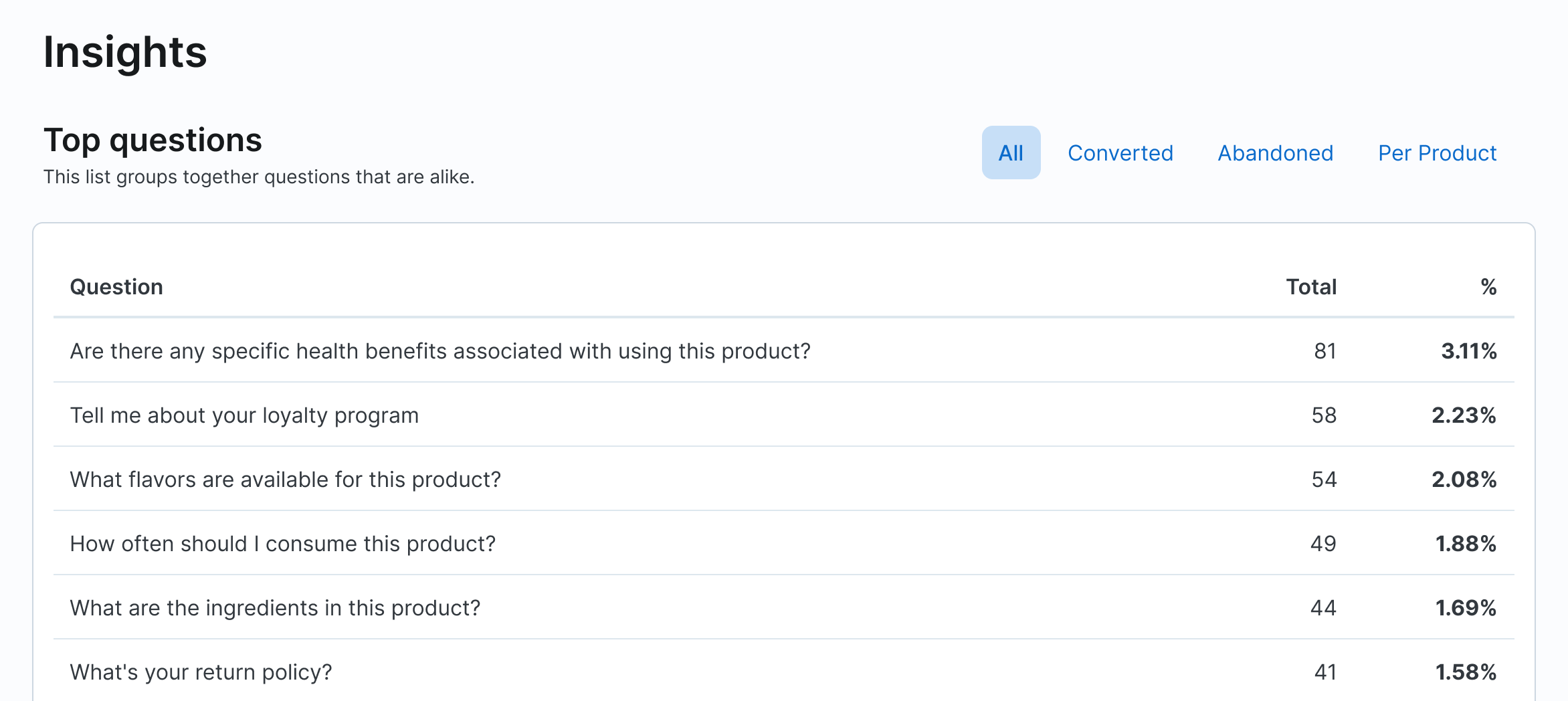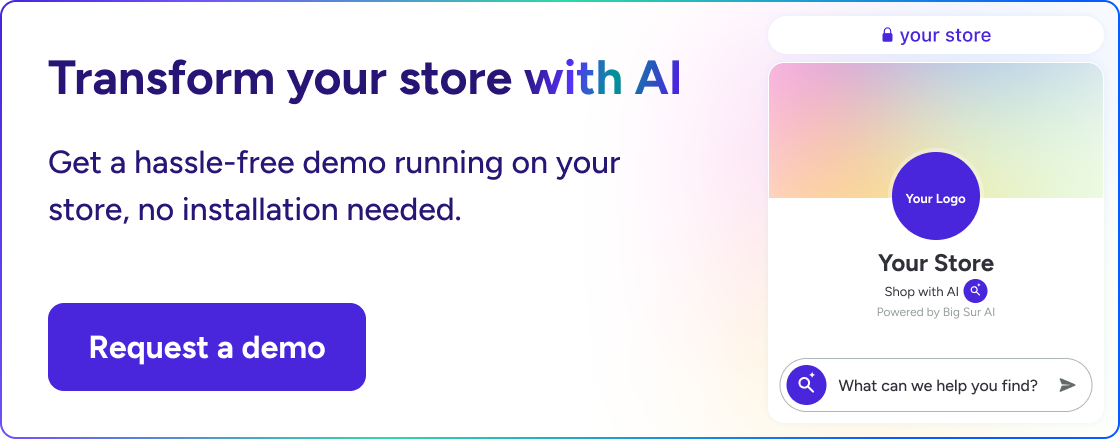AI in E-commerce: Guide for Merchants in 2025
AI in e-commerce has been gaining traction, as 78% of online stores have already implemented AI or plan to do so.
In this article, we'll go over how AI is changing the e-commerce industry, and how merchants are using the technology to transform their stores.
TL;DR
- AI's strength lies in its ability to uncover patterns from user data, understand user intent, converse with consumers, and recommend products.
- The technology can be used outside of websites as well, such as in targeted marketing and advertising campaigns.
- The primary benefits of AI for e-commerce sites are its personalization capabilities, improved decision-making, and ability to set up automations.
- The main use cases of AI for e-commerce are product recommendations, enabling AI-powered search, setting up a human-like chatbot, and cross-selling products.
- There are concerns regarding the use of AI, such as consumer privacy, the cost of implementation, and consumer distrust in AI technology.
How AI is Changing the E-Commerce Industry?
E-commerce stores are traditionally intended to replace brick-and-mortar stores.
And even though they created a place where people could find what they were looking for, the experience was not as personalized as in a physical store.
Marketers have also been struggling with analyzing their large chunks of data.
They've collected thousands of data points, but it's not easy to put that data into insights or use it to predict behavior.
Enter Artificial Intelligence: Now marketers can use AI's data mining, natural language processing, computer vision, and machine learning capabilities to create a personalized customer experience.
- Data mining is used to uncover patterns and insights from your database to identify opportunities and areas for growth.
- Natural language processing (NLP) is used to bring an AI-powered chatbot to your store that is available 24/7 and can converse with your customers.
- Machine learning (ML) is used to predict customer behavior, personalize product recommendations, and automate conversations, such as chatbots.
- Computer vision (CV) is used to interpret information from images and videos.
Merchants are also using AI outside of their websites.
For example, Pull & Bear used Luma AI to craft videos from product images that they can use in their advertising and social media.
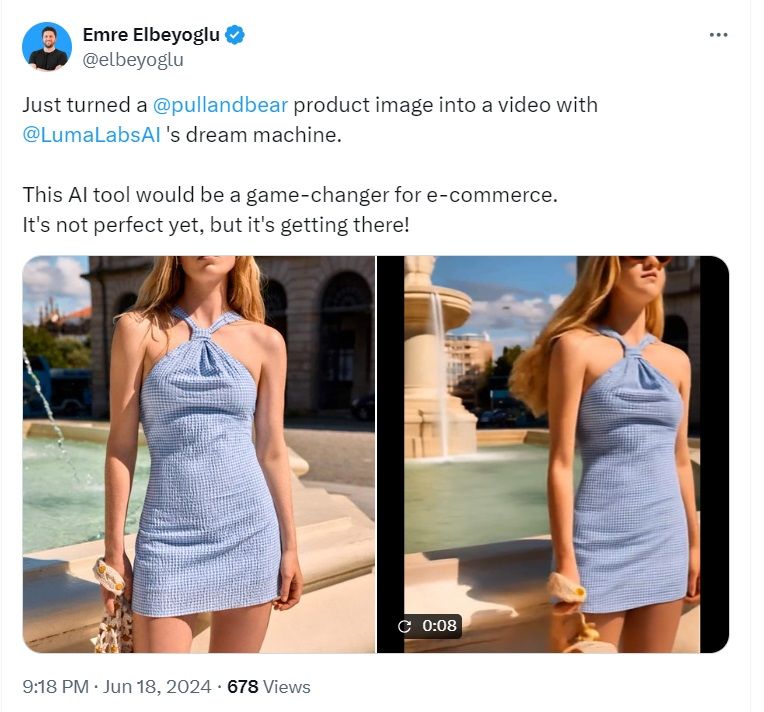
What are the benefits of AI for E-Commerce?
Benefits of using AI for e-commerce are:
Enhanced Personalization
AI allows you to improve your conversion rates, and average order value and reduce costs by building a more personalized customer experience.
This is done via AI-powered product recommendations and search functions that take into consideration your customers' history with the brand, and preferences obtained by first-party data.
According to McKinsey's research on omnichannel personalization, there's a 10-15% uplift potential in revenue and customer retention from personalization strategies.
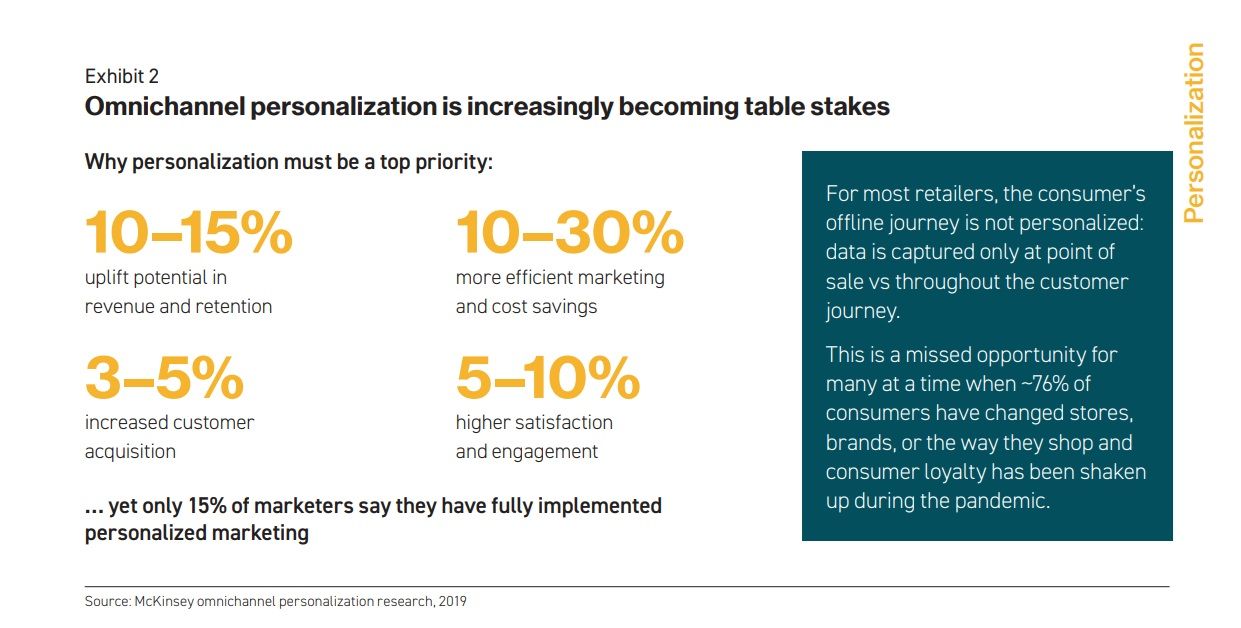
Targeted Marketing & Advertising
You can reach the right customers with the right products.
Customize your advertising, email campaigns, and retargeting to each customer by using their:
- Purchase history.
- Conversations with chatbots.
- Product preferences.
Retailers are combining AI and email to set up abandoned cart emails where a personalized email is sent to the customer with a product recommendation and discount count to incentivize them to finish the order.
Improved Decision-Making
Make data-driven decisions by putting all of that first-party data into action with Artificial Intelligence.
You can better:
- Manage your inventory by analyzing historical sales data to forecast product demand.
- Calculate the minimum discount required to sell a product.
- See what products are frequently bought together.
- Find what pre-purchase questions people have before they can make a decision.
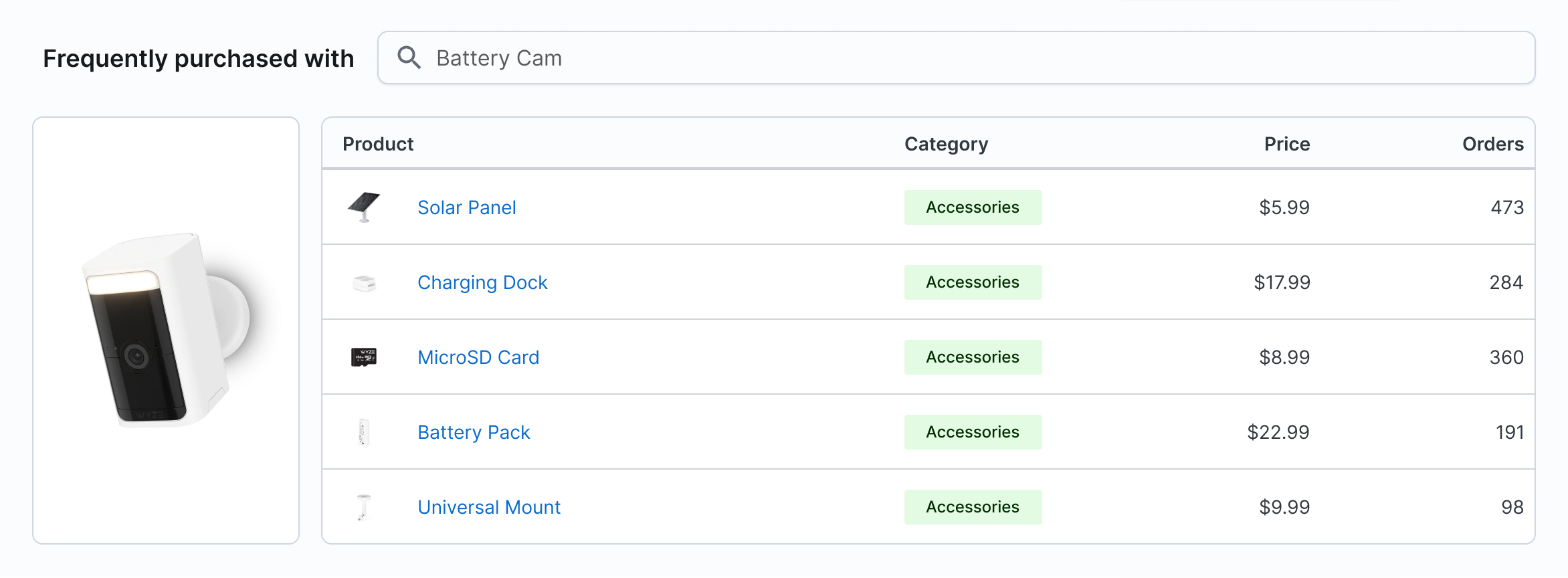
Big Sur AI gives merchants insights into what products are frequently bought together.
Automations
Automations in e-commerce are not only used to automate repetitive tasks but also to set up customer loyalty programs and product recommendations.
For example, you can set up an automated email campaign with a discount based on what products your customers were discussing with an AI-powered chatbot.
Or you can automate customer support by setting up a chatbot to answer commonly asked questions and assist customers with pre-built templates.
This is what Clove did when they used Yuma AI to automate 40% of their customer support tickets.
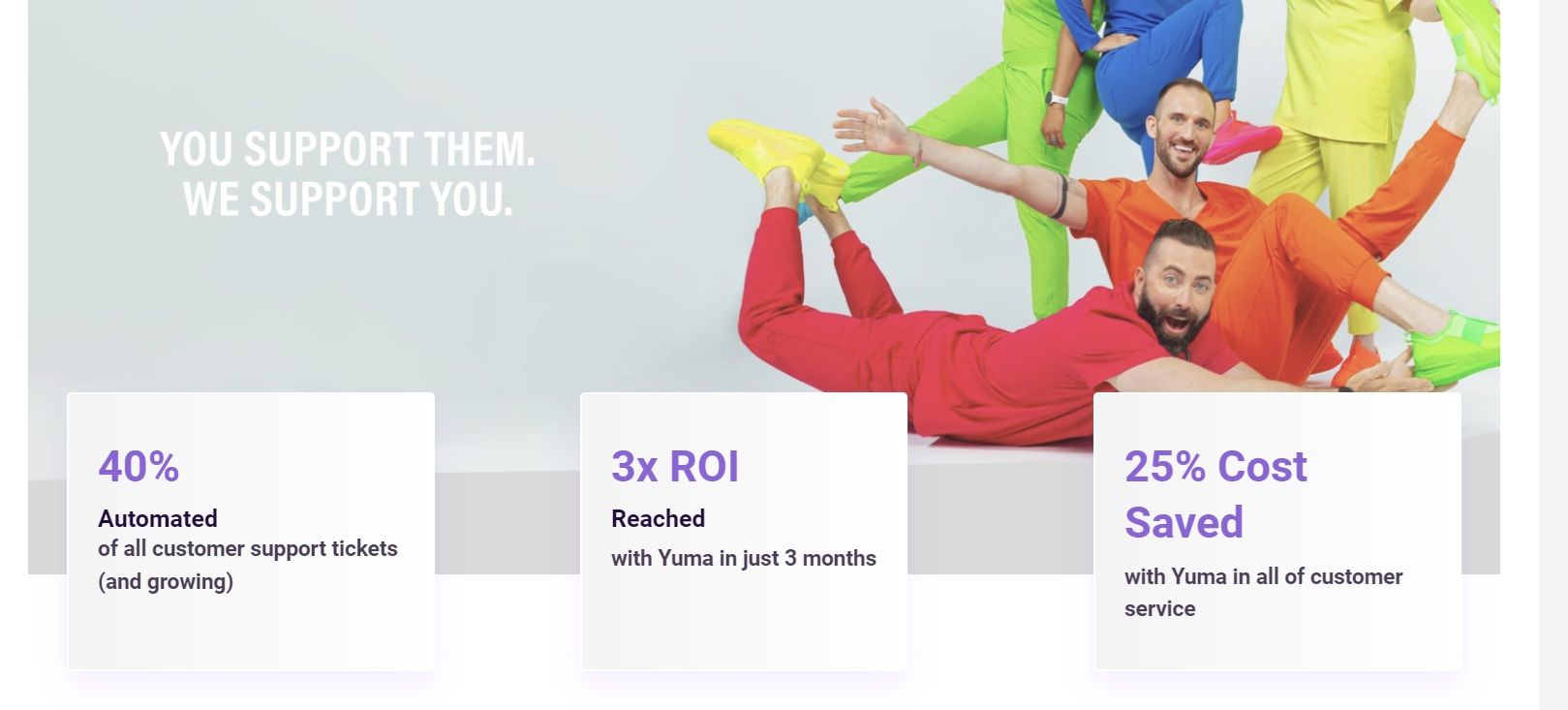
Increased Security
E-commerce brands can utilize fraud detection tools to analyze user behavior and spot shady transaction patterns.
These AI-powered security tools implement fraud detection algorithms that identify anomalies and prevent data breaches and unauthorized activities.
Keep your consumer data safe, and protect yourself against potential cyber threats.
What are the use cases for Artificial Intelligence in E-commerce?
The main use cases of using AI for e-commerce are:
Product Recommendations
AI technology uses customer behavior data such as past purchases, questions asked to a chatbot, and clicks, to recommend the most relevant products to your consumers.
These product recommendations can appear as part of a conversation, on the sales and category pages, or after searching in the search bar.
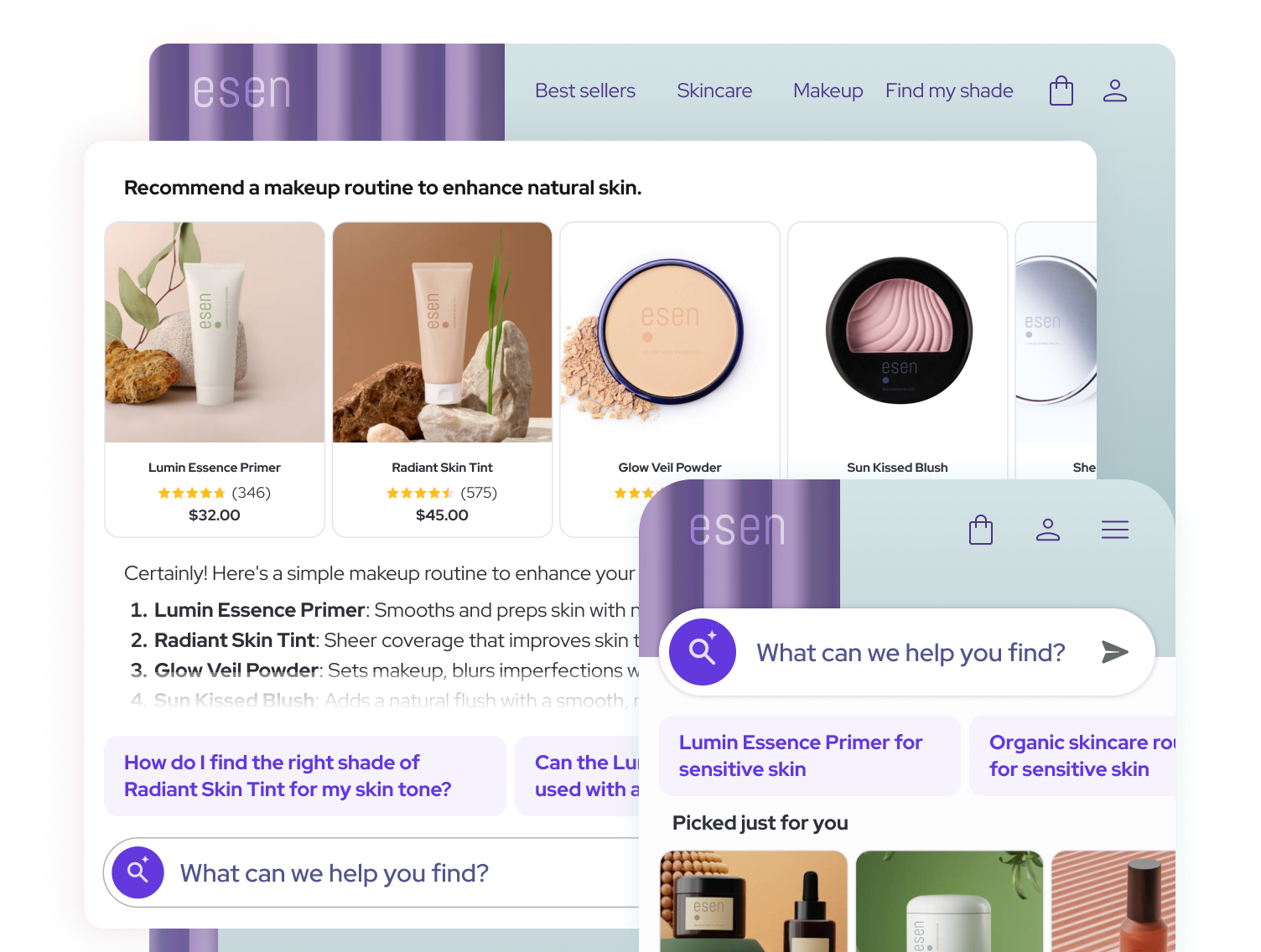
Big Sur AI provides your customers with an AI-powered chatbot that guides your customers to the right product(s) for them.
Merchants with a large product offering benefit from product recommendations the most - as they can assist their customers find the right product for them.
✅ Product recommendations help you increase your conversion rates because your consumers are more likely to find the product they are looking for.
❌ These recommendations require a good amount of consumer data to be highly accurate.
AI-Powered Chatbot
Consumers miss the experience of talking to a qualified sales professional to guide them through their shopping journey.
You can set up an AI assistant on your website which is a conversational chatbot that can answer in-depth questions and recommend products.
Using natural language processing (NLP), AI-powered chatbots can understand user intent and consider the customer's requirements.

Image: Bloomreach
💡A survey of more than 5,000 participants found that consumers are looking to browse and buy through messaging.
The chatbots are useful for not only recommending products to customers but also for post-purchase customer support.
They can provide real-time updates for shipments and package tracking.
✅ AI assistants can help your consumers in their product discovery and post-purchase phases, helping you improve both conversion rates and reduce costs.
❌ These chatbots can be hard to set up and are often costly.
AI Semantic Search
You can set up an AI-powered search function that understands the intent of the users' search query and gives them personalized results.
The semantic search function works the same as product recommendations do - the technology combines the search query with first-party data about the consumer, such as product preferences.
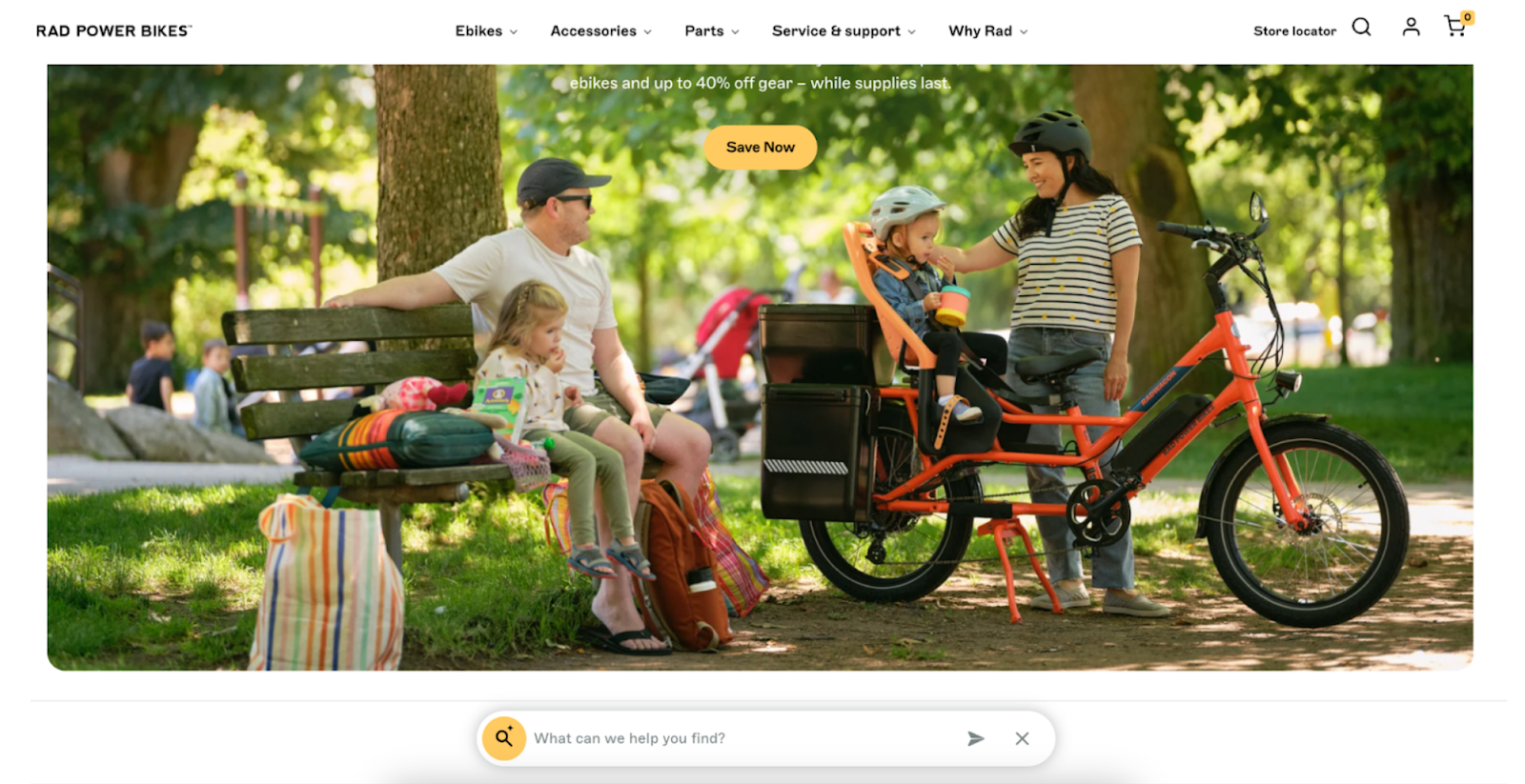
There are search functions that can also dynamically generate product and collection pages based on what your consumers are looking for.
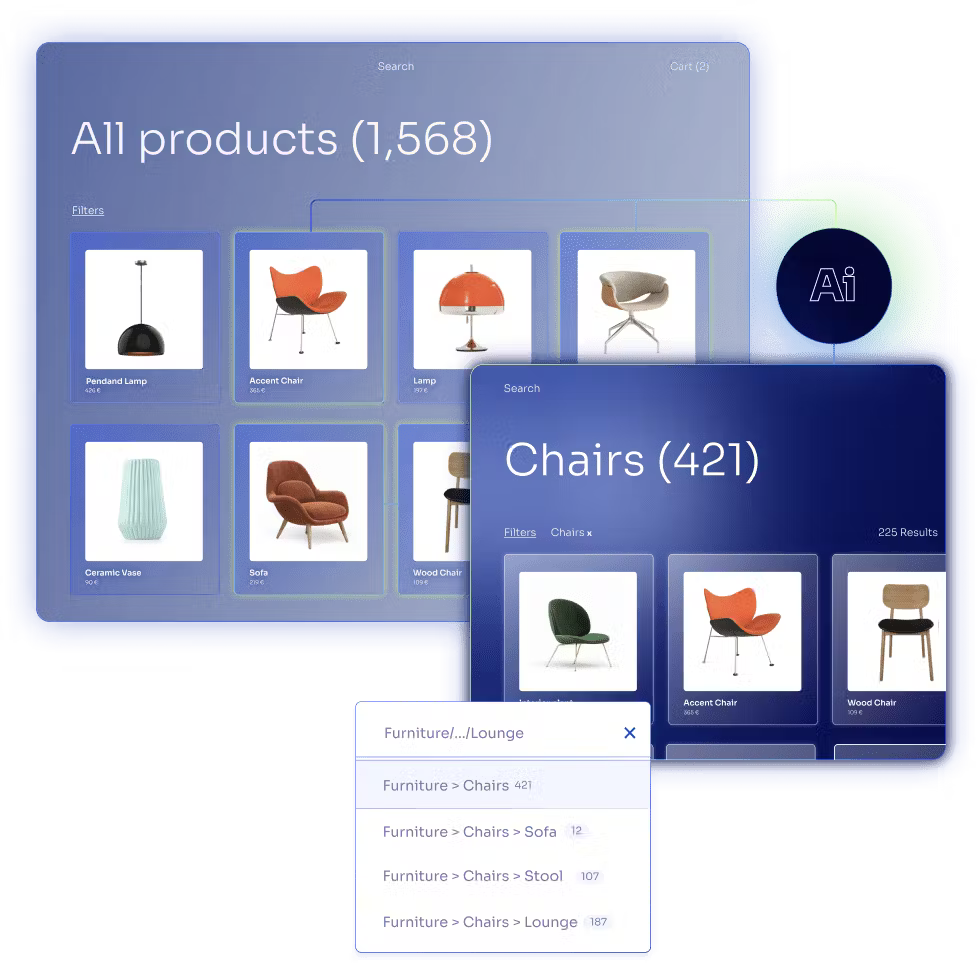
This way, you will reduce ''null'' search results and keep your consumers longer on the website.
✅ Minimize bounce rates from customers not being able to find what they are looking for, and reduce abandoned carts by providing a personalized product discovery experience.
❌ These search functions can be hard to set up.
Cross-selling & Upselling Products
By identifying consumer patterns, AI can increase your average order value (AOV) by cross-selling and up-selling products.
For example, Big Sur's AI can automatically generate:
- ''Picked for you'' product module that displays a selection of products that a user is most likely to purchase based on what the tool knows about them.
- ''Frequently bought together'' product module that appears when a consumer adds a product to cart.
- ''Top sellers'' product module that shows the bestseller in the product category.
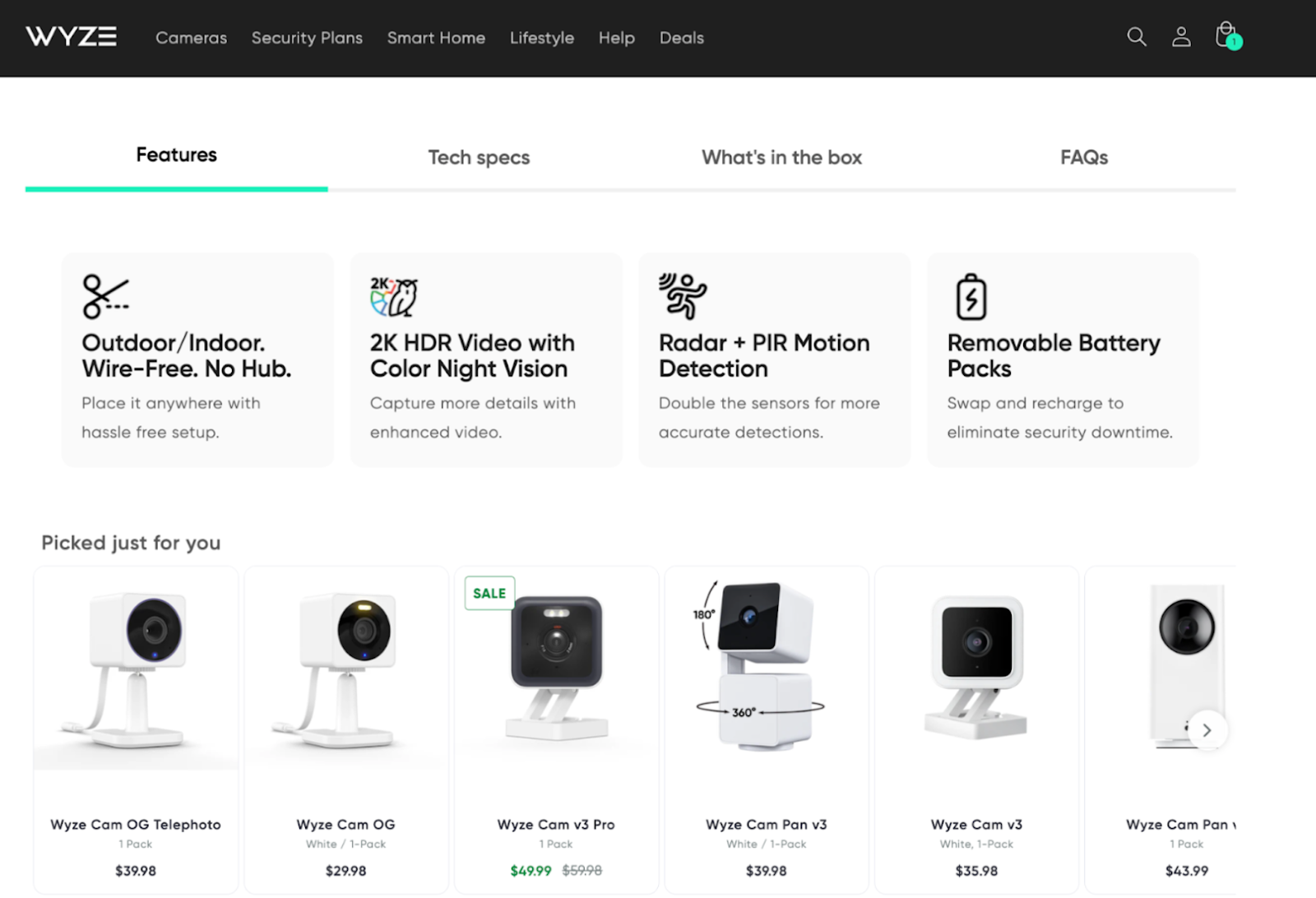
✅ Increase basket sizes and upsell higher value items to your customers - with minimum user data required.
❌ Showcasing too much product choice can confuse users.
Dynamic Content Delivery for Marketing & Advertising
AI tools can help e-commerce sites to provide a more personalized experience for customers outside of their websites.
Dynamic content delivery involves using AI to analyze customer data to create a personalized shopping experience across different marketing and advertising channels.
You can send out personalized emails based on the products that your customers are searching for and set up targeted advertisements.

✅ Improve advertising CTRs and conversion rates by showcasing hyper-targeted products and offers.
❌ The algorithm can misjudge the consumer, especially if the engine operates on limited data.
AI Concerns & Considerations To Keep in Mind
Data Privacy Concerns
AI deals with consumer data, which means that there are concerns from both customers and regulatory bodies.
The privacy concerns include the collection and storage of data, which can then be vulnerable to breaches or misuse.
Consumers may not always consent to these AI tools using their data, which means that the software may collect more data than necessary.
This is why it's important to adhere to data protection regulations, such as GDPR, and set up AI tools to work with first-party data that is collected ethically so you can mitigate these risks.
The Cost of AI Implementation
Setting up, maintaining, and using advanced AI features for e-commerce is usually not cheap.
Some of the tools on the market can cost up to tens of thousands of dollars per month.
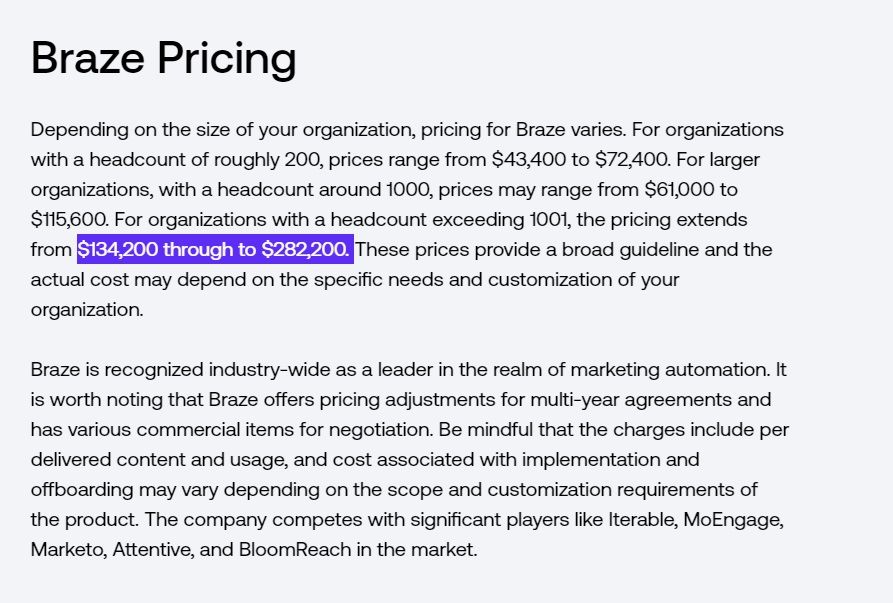
This is why you must choose a pricing model that works for your brand, where you can see a positive return on investment (ROI) from the tools.
For example, our AI tool, Big Sur AI, has a commission-based pricing model —merchants only pay us for sales attributed to our software.
Consumer Trust in AI
''AI recommended this product for you'' is not a statement that commands trust in the minds of all consumers.
Even though AI enthusiasts are thrilled by the idea of product recommendations and ''picked for you'' sections, some shoppers may not appreciate a ''robot telling them what to buy''.
For example, a survey from Statista found that 43% of Baby Boomers did not wish for AI personalization of any kind in their customer journey.
Some consumers might also doubt AI recommendations because they think the tools are biased toward selling them the most expensive products.
AI requires strong data to work with
Artificial Intelligence thrives with high-quality data.
The technology will likely create hyper-targeted recommendations and targeted marketing if you feed the algorithms with consumer preferences, location, and shopping history data.
But if your tool is not able to capture that data - or is not fed this data - it can provide generic or misleading recommendations.
And wrong recommendations would lead to decreased consumer trust in your brand.
This is why brands need to invest in data infrastructure, deploy data cleaning tools, and have a data collection policy in place to ensure that all data is collected ethically.
Implement AI For Your Business With Big Sur AI
Big Sur AI is an AI-powered sales agent that aims to increase your conversion rates and AOV by assisting your customers find the best product for their needs.
The tool starts off as a semantic search and turns into a conversational chatbot that acts as a qualified sales assistant to help them with their pre-purchase and post-purchase shopping experience.
Designed with conversions in mind, our AI Sales Agent has been optimized to provide relevant recommendations based on user data and propose follow-up questions.
All of these product recommendations and follow-up questions are data-driven and designed to increase your store's conversion rate.
💡Customers who interact with Big Sur AI Sales Agent convert at 4 times the rate of the average store user.
The chatbot can understand user intent and recommend the right product for your customers' needs.
For example, if your consumers prompt the tool to recommend a bike for their height, the tool will list out a few possible options:
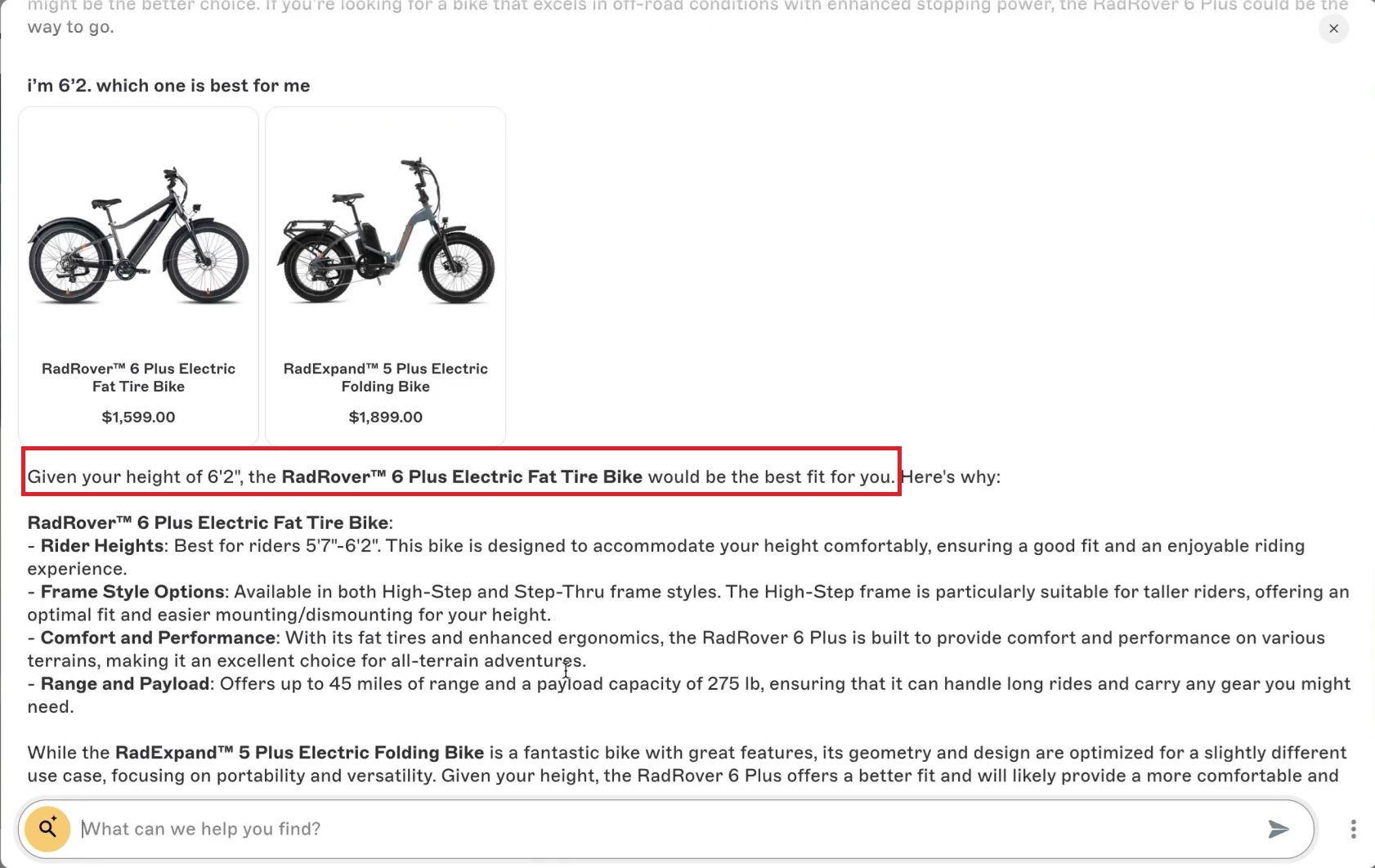
Apart from conversing with customers, the tool can also:
- Cross-sell and up-sell your customers on a product page level with targeted product recommendations.
- Suggest questions for your customers to ask to improve their purchasing confidence.
- Recommend frequently bought together products.
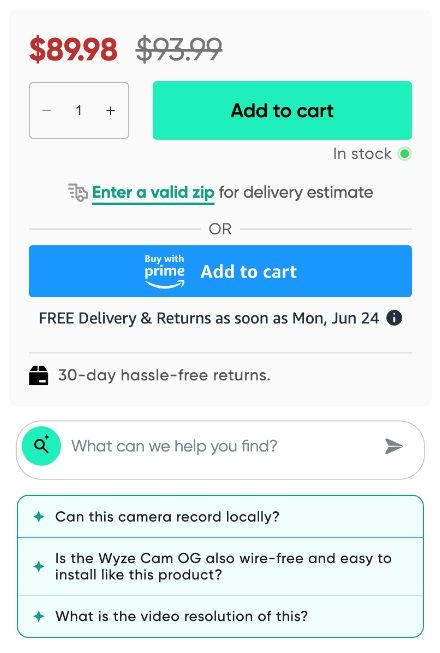
You'll also get insights into the conversion rates of each question that your customers are asking the chatbot.
This will help your marketing team identify the crucial pre-purchase questions interested customers ask.
